- Home
- Joseph Heller
Catch As Catch Can Page 13
Catch As Catch Can Read online
Page 13
All the team won, though, was the same old thrill of winning, and that didn’t make so much sense. Playing basketball made a lot more sense than playing baseball, because throwing the ball through the hoop was not quite as indecorous as running around a bunch of bases and required much less teamwork.
Yossarian enjoyed playing basketball because it was so easy to stop. He was able to stop the game every time simply by throwing the ball as far away as he could every time he got his hands on it and then standing around doing nothing while somebody else ran to get it.
One day, Rogoff sprinted up to Yossarian’s basketball court during the game and wanted to know why nine men were standing around doing nothing. Yossarian pointed toward the tenth man, who was chasing the ball over the horizon. He had just thrown it away.
“Well, don’t just stand there while he gets it,” Rogoff urged.
“Do push-ups.”
Finally, Yossarian had had enough, as much exercise, judo, left jabs, baseball and basketball as he could stand. Maybe it all did save lives, he concluded, but at what exorbitant cost? At the cost of reducing human life to the level of a despicable animal— of an eager beaver.
Yossarian made his decision in the morning, and when the rest of the men fell out for calisthenics in the afternoon, he took his clothes off and lay down on his bed on the second floor of his barrack.
He basked in a glow of superior accomplishment as he lay in a supine position in his undershorts and T-shirt and relaxed to
the rousing, strenuous tempo of Rogoff’s overburdened voice putting the others through their paces just outside the building. Suddenly, Rogoff’s voice ceased and those of his two assistants took over, and Yossarian heard his footsteps race into the building and up the stairs. When Rogoff charged in from the landing on the second floor and found him in bed, Yossarian stopped smirking and began to moan. Rogoff slowed abruptly with a look of chastened solicitude and resumed his approach on tiptoe.
“Why aren’t you out doing calisthenics?” he asked curiously when he stood respectfully by Yossarian’s bed.
“I’m sick.”
“Why don’t you go on sick call if you’re sick?”
“I’m too sick to go on sick call. I think it’s my appendix.”
“Should I phone for an ambulance?”
“No, I don’t think so.”
“Maybe I’d better phone for an ambulance. They’ll put you in bed in the hospital and let you rest there all day long.”
That prospect had not occurred to Yossarian. “Please phone for an ambulance.”
“I’ll do it this very minute. I’ll—oh, my goodness, I forgot!”
Rogoff whirled himself around with a bleat of horror and flew at top speed down the long boards of the echoing floor to the door at the end of the barrack and out onto the tiny wooden balcony there.
Yossarian was intrigued and sat up over the foot of his bed to observe what was going on.
Rogoff jumped up and down on the small porch, clapping his hands over his head.
“One, two, three, four,” he began yelling downward toward the men on the ground, his voice struggling upward dauntlessly into his tortured and perilous falsetto. “One, two, three, four. Hubba, hubba.”
“Hubba, hubba, hubba, hubba,” came back a sympathetic mass murmur from his invisible audience below that lasted until Rogoff raised his hand high in a formal caricature of a traffic cop and choked it off.
“That’s the way, men,” he shouted down to them, with a clipped nod of approbation. “Now we’ll try some deep knee bends. Ready? Hands on hips… place!” Rogoff jammed his own hands down on his hips and, with his back and neck rigid, sank down vigorously into the first movement of a deep knee bend. “One, two, three, four, one, two, three, four.”
Then Rogoff sprang up, whirled himself around again and flew back inside the building toward Yossarian and zipped right past him with a chin-up wave of encouragement and pounded down the stairs. About ten minutes later, he came pounding back up the stairs, his corrugated red face redder than a beet, zipped right past him with a chin-up wave of encouragement and flew down the full length of the building again and out onto the balcony, where he yanked the men out of their deep knee bends, hubba-hubbaed them a few seconds and flung them back into straddle jumping. He was showing signs of the heavy strain when he returned to Yossarian. His spare, ropy chest was pumping up and down convulsively in starving panic, and fat, round drops of sweat were shivering on his forehead.
“It will take—I ain’t getting any air! It will take the ambulance a little while to get here,” he puffed. “They have to drive from all the way across the field. I still ain’t getting any air!”
“I guess I’ll just have to wait,” Yossarian responded bravely.
Rogoff caught his breath finally. “Don’t just lie there while you’re waiting for the ambulance,” he advised. “Do push-ups.”
“If he’s strong enough to do push-ups,” said one of the stretcher-bearers, when the ambulance was there, “he’s strong enough to walk.”
“It’s the push-ups that make him strong enough to walk,” Rogoff explained with professional acumen.
“I’m not strong enough to do push-ups,” Yossarian said, “and I’m not strong enough to walk.”
A strange, regretful silence fell over Rogoff after Yossarian had been lifted onto the stretcher and the time had come to say farewell. There was no mistaking his sincere compassion. He was genuinely sorry for Yossarian; when Yossarian realized that, he was genuinely sorry for Rogoff.
“Well,” Rogoff said with a gentle wave and finally found the tactful words. “Hubba, hubba.”
“Hubba, hubba to you,” Yossarian answered.
“Beat it,” said the doctor at the hospital to Yossarian.
“Huh?” said Yossarian.
“I said, ‘Beat it.’”
“Huh?”
“Stop saying ‘Huh?’ so much.”
“Stop telling me to beat it.”
“You can’t tell him to beat it,” a corporal there said. “There’s a new order out.”
“Huh?” said the doctor.
“We have to keep every abdominal complaint under observation five days, because so many of the men have been dying after we make them beat it.”
“All right,” grumbled the doctor. “Put him under observation five days and then throw him out.”
“Don’t you want to examine him first?” asked the corporal.
“No.”
They took Yossarian’s clothes away, gave him pajamas and put him to bed in a ward, where he was very happy when the snorers were quiet, and he began to think he might like to spend the rest of his military career there. It seemed as sensible a way to survive the war as any.
“Hubba, hubba,” he said to himself.
CATCH-23*
Yossarian Lives
When we last saw Yossarian, it was 1945 and he was preparing to save his life—and his sanity—by running away from the Twenty-seventh Air Force in the Mediterranean and heading for Sweden, though he did not think he would be able to get there. Forty-odd years later…
1
Yossarian began dreaming of his mother, and he knew he was going to die. The doctors were upset when he gave them the news.
“We can’t find anything wrong with you,” they kept insisting with unanimity.
“Keep looking,” he instructed them.
“You’re in perfect health.”
“Just wait.”
Yossarian was back in the hospital, having retreated there again under another one of those neurotic barrages of confusing physical symptoms to which he had been increasingly vulnerable since finding himself dwelling alone for the first time in his life, had, so to speak, gone bolting back in after just four months out at the shocking announcement that George Bush was indeed determined to resign from the presidency, no matter who would succeed him, and at the startling intelligence, inadvertently come by, that Milo Minderbinder, with whom Yossarian was by now
indefinably, uncomfortably, and indissolubly united, was expanding beyond surplus commodities like old chocolate, old Egyptian cotton, secondhand uranium fuel rods, and reconditioned nuclear reactors into the area of military equipment with plans for a warplane of his own advanced design, armed with atomic weapons, that he intended to sell to somebody.
These two were reasons enough to be fearful, and he had a fresh tide of others. Another oil tanker had broken up. This was not mere hysteria. There was venality in government. Responsible industrialists in West Germany were selling the technology to manufacture poison gas to belligerent militarists in the Middle East who would surely employ those same poison gases against the industrialists and their countrymen in the great war between East and West that was someday certain to break out, the war to end wars. In California a boyish young adult named Mike Milken had reputedly earned $550 million in one calendar year by providing not one product or service of any social value to anyone in the national community other than those who happily made possible his extraordinary compensation and doubtless felt he was worth at least as much as he received, while in Iran the leading religious leader had posted a reward of $1 million for the murder of a novelist living in London who had written a novel irreligiously. China, a developing nation with by far the largest population on earth, was developing into a major weapons supplier. The United States was financing an anti-Soviet revolutionary movement in Afghanistan, the Soviet Union was financing one anti-American regime in Cuba and another in Nicaragua and selling the latest in sophisticated warplanes to the
warmongering leader of Libya; India had nuclear power; Pakistan was testing a long-range missile. There was nerve gas in Iran, low-enriched uranium in South Africa, heavy water in Argentina and India, and uranium-and tritium-processing plants sprouting up all over the Near East and the Far East. There was discord in Israel. Winston Churchill was gone, as were Mussolini and Fred Astaire, and Joe DiMaggio was going. Yossarian’s mother and father were dead, and so by now were all of his uncles and aunts, and it wasn’t funny. And if that wasn’t funny, there were other things that weren’t even funnier. Everywhere Yossarian looked was another nut, and it was all that a reasonable and eminent senior citizen like himself could do to maintain his own benevolent mental stability amid so much madness and moral and physical danger. His health was in jeopardy, and he knew he needed help.
At least once each morning the doctors came bursting in without an appointment, breezing right in upon Yossarian in a peremptory, brisk, and serious tutorial group, his doctor Leon Shumacher with his brisk and serious entourage of brisk and serious burgeoning physicians with efficient faces and inefficient eyes, accompanied by Melissa Wedenmuller, the lively, attractive floor nurse with the pretty face and the magnificent ass who was openly drawn to Yossarian, despite his years, and whom he was slyly enticing to develop a benign crush on him, despite her youthfulness. She was a tall woman with impressive hips who remembered Pearl Bailey but not Pearl Harbor, which put her age, he had calculated, somewhere between thirty-five and sixty, the best stage, he believed, for a woman. He had no idea what she was really like. He unscrupulously embraced with enormous selfishness every chance he spied to help pass the time enjoyably for the several peaceful weeks he was resolved to remain in the hospital to rest up and put his outlook together. Like the inept navigator he’d been for a few months of operational training in the army air corps in Columbia, South Carolina, during the Second World War and on the flight overseas from there to Brazil and Africa and finally on to Pianosa in the Mediterranean, he mostly did not know where he was or what direction to take. When he confessed this to intimates, they did not believe him.
It was a good room this time, with pleasant neighbors who were not critically or offensively ill and an expansive view of the park, and it was Melissa, laughing modestly and with a flounce of hauteur, who had made the pronouncement that the ass she had was magnificent.
Magnificent the ass or not, by the middle of his first week Yossarian was flirting with all his might with this approachable and responsive woman upon whom he now depended for his well-being and for most of his occasional, brief good times. Dr. Leon Shumacher did not look kindly upon this salacious frivolity.
“It’s bad enough I let you in here. I suppose we both ought to feel ashamed, you in this room when you aren’t sick—”
“Who says I’m not?”
“—and so many homeless people outside on the streets.”
“Will you let one in here if I agree to leave?”
“Will you pay the bills?”
Yossarian preferred not to.
Some mornings when Leon came breezing in with his deferential bunch, he would have in tow some distinguished medical peer or two from areas of professional dedication remote from his own who had signed up for the excursion that day simply to gaze in wonderment at this notorious and jittery patient who had come back into the hospital again for his thorough annual checkup just four months after his last one because he’d had a brief vision of a morbid vision and because he felt more at home in the hospital with them than he did at home with whomever he lived with and because he felt very much safer inside a private room with a good view of a very risky park than he did outside in the world of business, where he was now in semi-retirement as something of a semiconsulting semiexecutive after
serving as a consulting executive with Milo Minderbinder and his M&M Enterprises & Associates for something like twenty-five consecutive years.
A great man with angiograms confirmed to Yossarian soberly that he did not need one, and a neurologist reported with equal gloom that there was nothing the matter with his brain. Leon Shumacher himself was recognized locally as a foremost national authority on stones in the gallbladder and myasthenia gravis, subjects without connection to each other. Leon himself was susceptible to chronic spastic colitis and feverish jealousy of people like his children who were not doctors or entertainers and yet made very much more money than he did. Yossarian did not have myasthenia gravis and had no stones in his gallbladder, and Leon again was using him pridefully with his pupils as an exemplary model of a patient entirely free of all of the symptoms—every single one—normally associated with myasthenia gravis or any irregularity in the functioning of the gallbladder. He was a rare specimen that doctors would not have the opportunity to come upon often in their medical careers, and they must study him closely, a man without symptoms of any disease, not even hypochondria.
There was no blood in his stool, but they examined him inside anyway, up and down, with instruments of simple appearance and glints of light that pumped in air to inflate his own inner tubes for simplified viewing. His auditory and spinal apparatus had been CAT scanned. The physicians found nothing. Even his sinuses were always clear, and there was no evidence anywhere of arthritis, bursitis, angina, or neuritis. His blood pressure and breathing capabilities were the envy of every doctor who saw him. He gave urine and they took it. He had demanded a urologist and they had delivered one for discussion and clarification of the sample, as well as for some illuminating commentaries on his reproductive organs: during the last thirty or forty years, he admitted bashfully, his procreative urges, his
libido,so to speak, had flagged considerably from a peak in late adolescence and early manhood.
“So has mine,” said Leon Shumacher in grumpy consolation when they were discussing the test results. He was grumpy because Yossarian seemed much more blithe about that waning in virility than Shumacher could be about his. “And my prostate is just as enlarged as yours is.”
“And what difference does that make?” asked Yossarian impatiently. “Leon, do you think I care what’s happening to you? There was a time I felt I could bludgeon down doors with my hard-ons. Now look at my poor thing.”
“Never mind. Put it back in, John. Where do you think you are? You’re not going to live forever, you know.”
“Yes, I am,” Yossarian shot back. “Or I’ll at least die trying. And I am still counting on you people
in the medical world to make that possible, but with less and less confidence. What’s the matter with you people? Why can’t you move?”
There’d been a lymphologist for his lymph, a dermatologist for his derma, an endocrinologist for his endocrines, a physiatrist for his physique, a cystologist for his cysts, and an articulate orthopedist for his orthopedic articulation. His hematologist had twice given his blood a clean bill of health: his cholesterol was low, his hemoglobin was high, and even his blood nitrogen was ideal. The experts found no polyps or fissures, not a single hemorrhoid, no problems with elimination or respiration. They found him phenomenal. And they pronounced him a perfect human being.
Yossarian did not believe it.
Biologically, they said, he was a credit to the human race. Yossarian did not believe that one either. He thought his wife, from whom he had now been separated a full year, might have some demurrers as well.
There was a champion cardiologist for his electrocardiograms and thoracic fluoroscopes, who found no fault with them; a pathologist for his pathos, who found no cause for concern either; an enterprising gastroenterologist, who ran back to the room for a second opinion from Yossarian on some creative investment strategies he was considering in Arizona real estate; a cryptographer for his handwriting; and a psychologist for his psyche, upon whom Yossarian was left in the end with no recourse but to rely, as the last resort.
“I think I can confide in you,” he said to the psychologist. “I have to know if it’s psychogenic or not. Do I really feel this good and healthy now, or am I just imagining I do? It has me worried. I even have this full head of hair.”
“I think the head of hair is remarkable.”
“And what about these periodic periods of boredom and fatigue and disinterest and depression?” Yossarian rushed on in a whirlwind of whispers. “I find myself detached from listening to things that other people take quite seriously. I’m tired of information I can’t use. I wish the daily newspapers were smaller and came out weekly. I’m not interested anymore in all that’s going on in the world. Comedians don’t make me laugh, and long stories drive me wild. Nothing moves me the way it used to. Is it me, or has the world grown boring? If I were younger, I might want to save myself and maybe even most of humanity. If my children were younger, I would feel some responsibility to save them. If I were closer to my grandchildren and found them endearing, I would tremble for their safety and want to cry. But I don’t feel these things and am tired of trying to convince myself I maybe ought to. My enthusiasms are exhausted. Tell me straight, Doc. I’ve got to have the truth. Is my depression mental?”

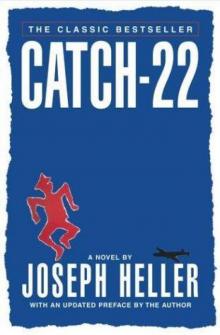 Catch-22
Catch-22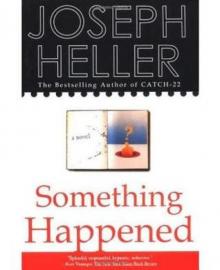 Something Happened
Something Happened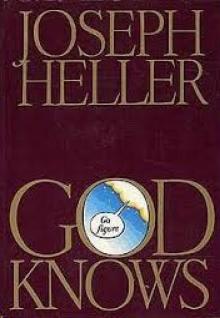 God Knows
God Knows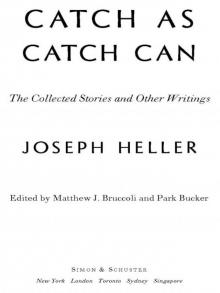 Catch As Catch Can
Catch As Catch Can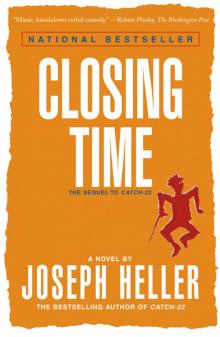 Closing Time
Closing Time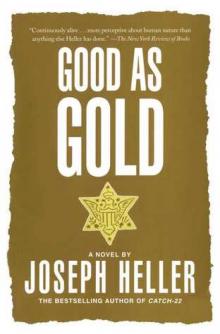 Good as Gold
Good as Gold Almost Like Christmas
Almost Like Christmas